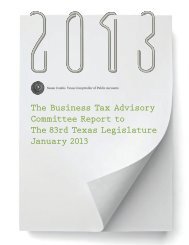Contracts Management Guide - Texas Comptroller of Public Accounts
Contracts Management Guide - Texas Comptroller of Public Accounts
Contracts Management Guide - Texas Comptroller of Public Accounts
You also want an ePaper? Increase the reach of your titles
YUMPU automatically turns print PDFs into web optimized ePapers that Google loves.
Individual state agencies may have statutory purchasing authority that is independent <strong>of</strong> the authority delegated by<br />
CPA; therefore, a thorough examination <strong>of</strong> each state agency’s statutory purchasing authority is necessary to identify an<br />
agency’s purchasing or contracting authority.<br />
Legal Elements <strong>of</strong> a Contract<br />
The essential elements necessary to form a binding contract are usually described as: xlvii<br />
• An Offer<br />
• An Acceptance in strict compliance with the terms <strong>of</strong> the <strong>of</strong>fer<br />
• Legal Purpose/Objective<br />
• Mutuality <strong>of</strong> Obligation – also known as the “meeting <strong>of</strong> the minds”<br />
• Consideration<br />
• Competent Parties xlviii<br />
Offer<br />
An <strong>of</strong>fer is defined as the manifestation <strong>of</strong> the “willingness to enter into a bargain so made as to justify another person<br />
in understanding that his assent to the bargain is invited and will conclude it.” xlix<br />
Acceptance<br />
Acceptance <strong>of</strong> an <strong>of</strong>fer can occur in several ways: Acceptance <strong>of</strong> an <strong>of</strong>fer is a manifestation <strong>of</strong> assent to the terms<br />
there<strong>of</strong> made by the <strong>of</strong>feree in a manner invited or required by the <strong>of</strong>fer. l An acceptance must not change the terms <strong>of</strong><br />
an <strong>of</strong>fer. If it does, the <strong>of</strong>fer is rejected. li A material change in a proposed contract constitutes a counter<strong>of</strong>fer, which<br />
must be accepted by the other party. lii<br />
Legal Purpose<br />
The objective <strong>of</strong> the contract must be for a legal purpose. For example, a contract for illegal distribution <strong>of</strong> drugs is not<br />
a binding contract because the purpose for which it exists is not legal.<br />
Mutuality <strong>of</strong> Obligation<br />
This element is also known as the “meeting <strong>of</strong> the minds”. Mutuality <strong>of</strong> obligation refers to the parties’ mutual<br />
understanding and assent to the expression <strong>of</strong> their agreement. liii The parties must agree to the same thing, in the same<br />
sense, at the same time. The determination <strong>of</strong> a meeting <strong>of</strong> their minds, and thus <strong>of</strong>fer and acceptance, is based on the<br />
objective standard <strong>of</strong> what the parties said and did and not their subjective state <strong>of</strong> mind. liv Unexpressed subjective<br />
intent is irrelevant. In determining whether mutual assent is present, the court looks to the communications between<br />
the parties and to the acts and circumstances surrounding these communications. lv The <strong>of</strong>fer must be clear and<br />
definite just as there must be a clear and definite acceptance <strong>of</strong> all terms contained in the <strong>of</strong>fer. lvi Where a meeting <strong>of</strong><br />
the minds is contested, the determination <strong>of</strong> the existence <strong>of</strong> a contract is a question <strong>of</strong> fact. lvii If the fact finder<br />
determines that one party reasonably drew the inference <strong>of</strong> a promise from the other party’s conduct, that promise will<br />
be given effect in law. lviii<br />
To be enforceable, the parties must have agreed on the essential terms <strong>of</strong> the contract. lix However, parties may agree<br />
upon some contractual terms, understanding them to be an agreement and leave other contract terms to be made<br />
later. lx Full agreement on all contractual terms is the best practice and should be the norm. It is only when an essential<br />
term is left open for future negotiation that there is nothing more than an unenforceable agreement to agree. lxi Such an<br />
agreement is void as a contract. lxii<br />
52

















